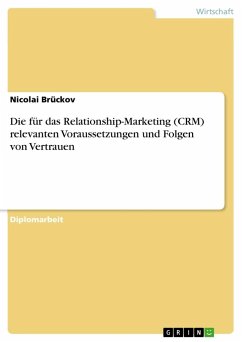
Reputation Transfer to Enter New B-to-B Markets
Measuring and Modelling Approaches
Versandkostenfrei!
Versandfertig in 6-10 Tagen
76,99 €
inkl. MwSt.

PAYBACK Punkte
38 °P sammeln!
An increasing number of products and services are not differentiated by inherent features, but by the vendors, particularly their reputation and marketing commu- cation. Consequently, a positive reputation provides competing vendors with a virtually inimitable competitive advantage. Contemporary research concerning antecedents and consequences of reputation in the domain of marketing is dominated by branding and line extension issues. Organizations' communication efforts and the relation of reputation and the c- munication media are not fully understood; nor have they been challenged up to now...
An increasing number of products and services are not differentiated by inherent features, but by the vendors, particularly their reputation and marketing commu- cation. Consequently, a positive reputation provides competing vendors with a virtually inimitable competitive advantage. Contemporary research concerning antecedents and consequences of reputation in the domain of marketing is dominated by branding and line extension issues. Organizations' communication efforts and the relation of reputation and the c- munication media are not fully understood; nor have they been challenged up to now. Moreover, customers' perception of reputation is clearly embedded in their cultural context. However, contemporary marketing research restricts both conceptual and empirical considerations to Western-type cultures. Frequently, even the differences in Western-type cultures are neglected. Considering these shortcomings in contemporary marketing research, Dr. Christine Falkenreck investigatesthe opportunities and limits, and also the potential bene?ts and dangers of transferring a vendor's positive reputation to product categories never produced or offered by the considered vendor. Embedding the empirical investigation of both reputation management and reputation transfer in a coherent theoretical framework, which is grounded in the Commitment-Trust theory, is her merit. She derives and validates an integrated model that appears to be valid in all cultures considered in her study. The results of this analysis contribute substantially to our understanding of reputation measuring and managing. These results are not restricted to academic interests and they provided practitioners with a variety of new insights. Thus, this thesis will ho- fully be widely discussed in bothacademia and management practice.














